The Importance of 24-Hour Home Care for Dementia Patients

When faced with a dementia diagnosis, "home" might just become the sweetest, most comforting word you know.
In the intimate, familiar surroundings of home, dementia patients can still flourish, supported by the love of their families and in-home caregivers.
Let’s delve into the world of in-home care for dementia patients and uncover how this option brings not just practical benefits but also showers of emotional sunshine to those touched by dementia. It’s a journey filled with compassion, patience, and a whole lot of love!
Table of Contents
Key Facts About Dementia Care
- The number of patients with Alzheimer’s disease — the most common form of dementia — will reach 88 million by 2050.
- 48% of all caregivers look after older adults with Alzheimer’s or another form of dementia.
- Family members, friends, and other unpaid caregivers make up 83% of the help provided to older adults. (Source: Eidschun and Ramage, 2021).
7 Benefits of In-Home Memory Care for Dementia Patients
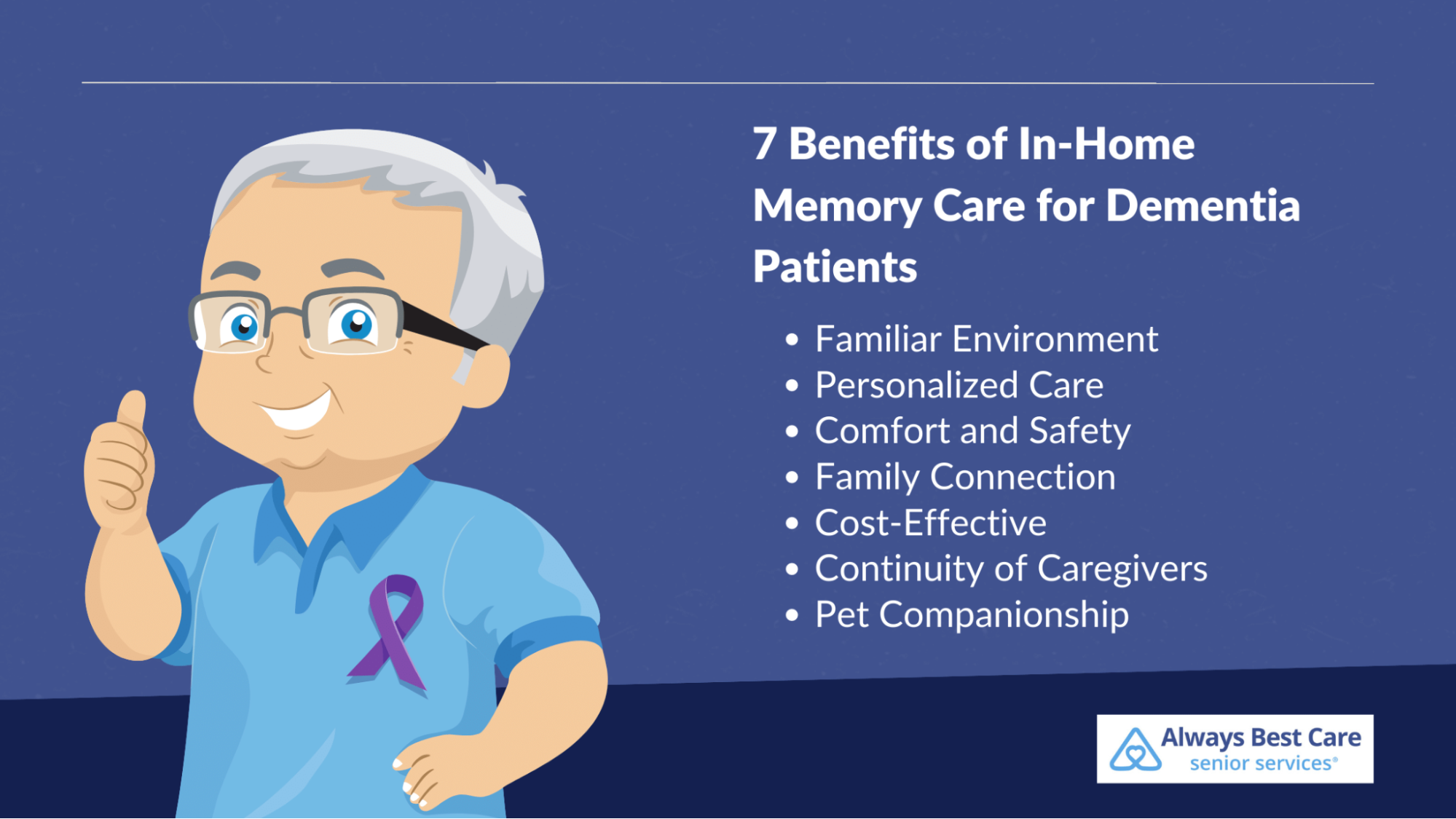
- Familiar Environment: Home is where the heart is. One of the main benefits of in-home memory care is that our loved ones stay in the environment they know and love. This sense of familiarity really helps ease feelings of confusion or fear associated with dementia.
- Personalized Care: An in-home care plan can be tailored specifically to your loved one’s routine. This means they get the care they need, when they need it, in the way that’s best for them.
- Comfort and Safety: Being able to sleep in your own bed, eat in your own kitchen, and sit in your favorite chair is a special kind of comfort. Plus, the home can be modified for safety as the dementia progresses, like adding handrails or removing tripping hazards.
- Family Connection: Staying at home means easier access for family visits. It will be helpful for dementia patients’ mental health to have regular, familiar faces around.
- Cost-Effective: Depending on the level of care needed, in-home care is often more cost-effective than residential care facilities.
- Continuity of Caregivers: With in-home care, the same caregiver or team of dementia caregivers is assigned to your loved one, fostering a relationship and providing a sense of continuity that may not be possible in a larger facility.
- Pet Companionship: If your loved one has a pet, they may continue to foster this companionship at home. Pets can bring so much joy and comfort!
4 Types of In-Home Care for Dementia Patients
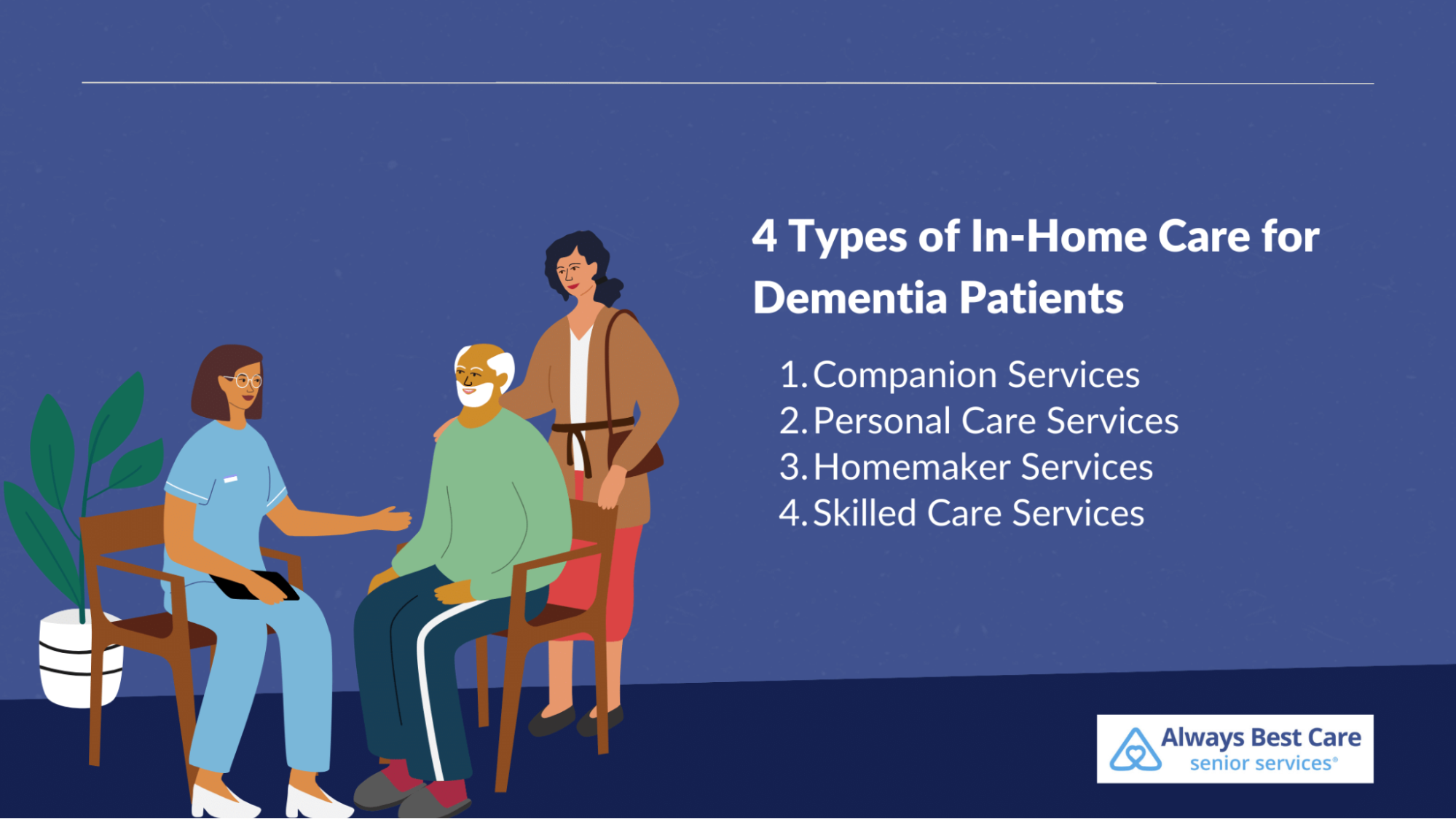
Companion Services
Companion services are a heartwarming kind of home care where the caregiver provides companionship and emotional support. They may participate in hobbies with your loved one, take them on outings, or just spend quality time with them chatting or watching their favorite shows. It’s all about boosting their social interactions and helping them feel less isolated.
Personal Care Services
Personal care services involve more hands-on support and assistance with daily activities too difficult for your loved one. We’re talking about bathing, grooming, dressing, and even helping with eating and mobility. It’s about preserving their dignity and ensuring their day-to-day life is as comfortable as possible.
Homemaker Services
Homemaker services are a practical type of care that ensures a safe and clean living environment. The caregiver will take care of tasks such as housecleaning, laundry, cooking, or even grocery shopping. Your loved one will have more time to focus on enjoying their life rather than worrying about chores.
Skilled Care Services
Skilled care is a type of medical care provided by healthcare professionals, who will help manage medications, provide wound care and physical therapy and monitor vital signs. They also offer critical health and behavior observations that can help adjust the care plan as needed.
How Do I Provide In-Home Care to People With Dementia?
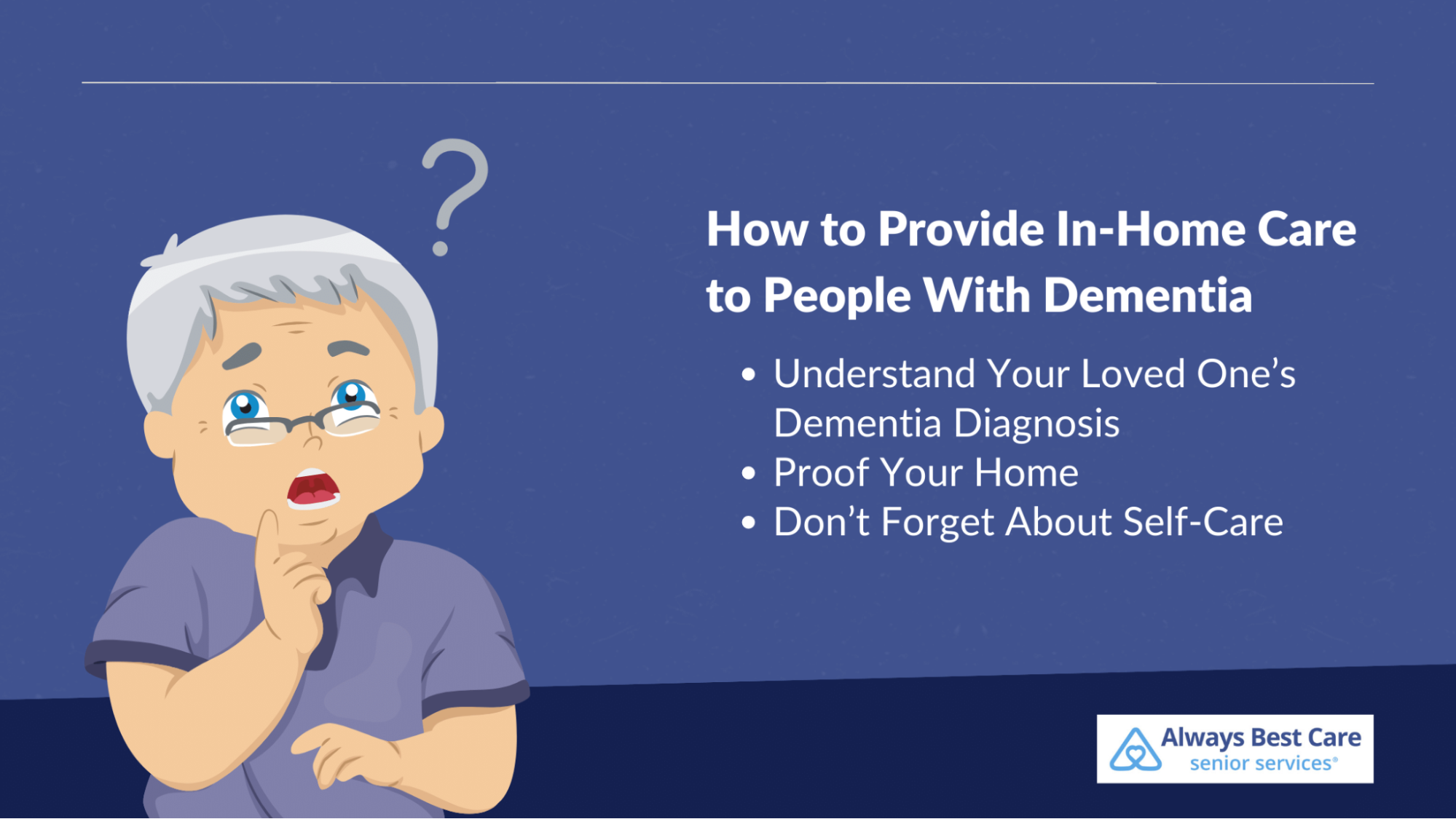
Understand Your Loved One’s Dementia Diagnosis
When it comes to providing in-home care for someone with dementia, the first and perhaps the most critical step is to understand and accept your loved one’s dementia diagnosis.
What type of dementia do they have? How does it affect them? What stage are they in? The answers to these questions will guide the kind of care you provide.
Don’t hesitate to reach out to healthcare professionals, social workers, or dementia support groups, who will provide valuable insights and guidance.
Proof Your Home
You need to create an environment that’s not only safe but also comforting and familiar for your loved one. This means removing clutter to prevent trips and falls or using labels and signs to help them navigate around the house. It might also involve installing safety devices like grab bars in the bathroom or a ramp for easier access.
Don’t Forget About Self-Care
While it’s absolutely essential to focus on your loved one, it’s just as important, if not more, to take care of yourself as well.
Providing care for a person with dementia can be emotionally and physically demanding, and it’s easy to neglect your own needs in the process.
But remember, you can’t pour from an empty cup.
Regular breaks, adequate sleep, healthy meals, physical exercise, and even leaning on a support network can help manage the stress and prevent caregiver burnout.
How to Improve Home Safety for Dementia Patients
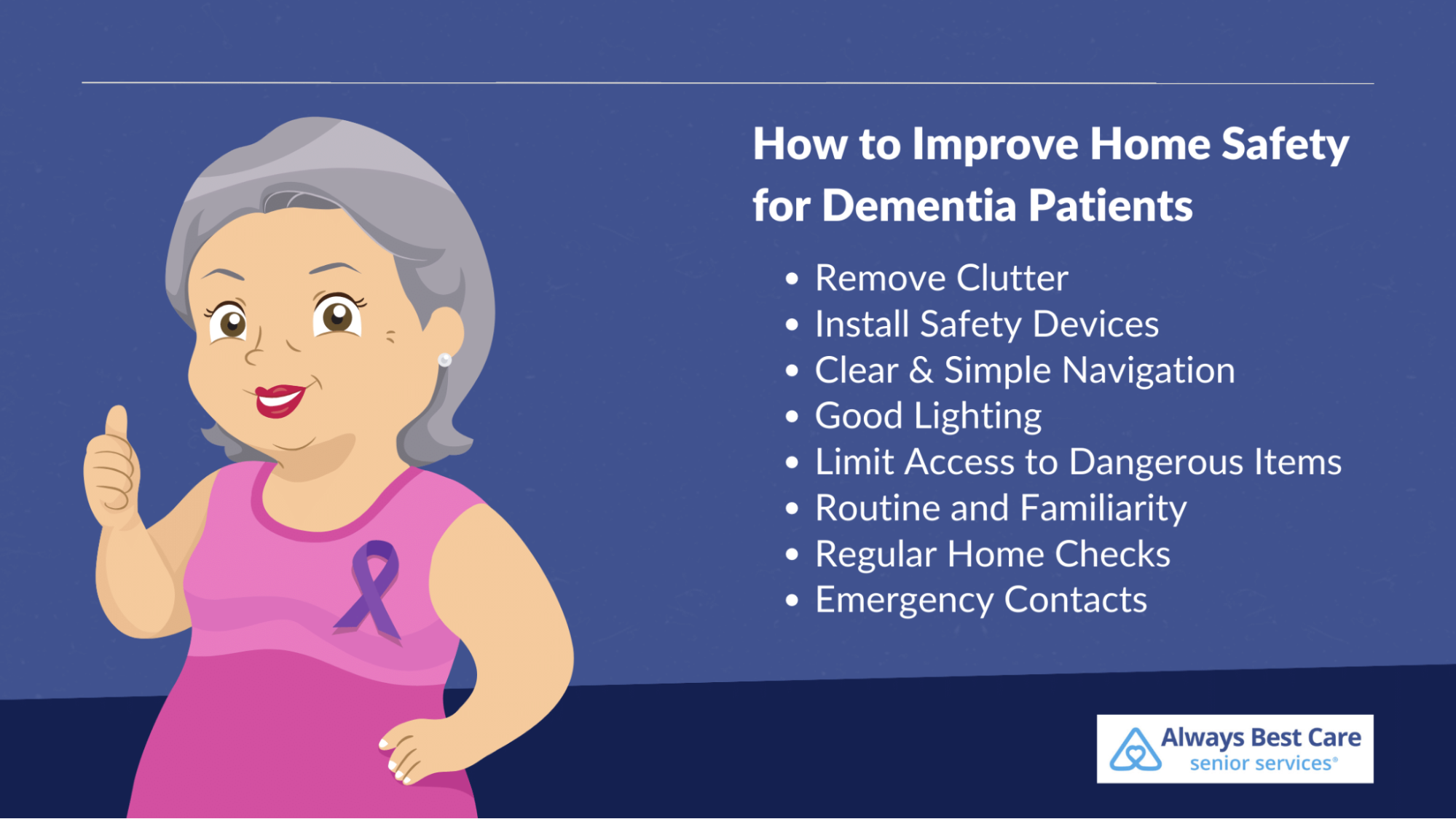
Dementia brings a unique set of challenges, and it’s important to adapt the living environment to keep your loved one safe:
- Remove Clutter: Keep the floors free from clutter to avoid trips and falls. Make sure there’s plenty of clear space to walk around (for example, by moving furniture around to create clear pathways).
- Install Safety Devices: Grab bars in the bathroom and non-slip mats can make a significant difference. Consider installing safety gates or locks to prevent wandering, particularly dangerous in the case of stairs or exits to busy roads.
- Clear & Simple Navigation: Clear labeling on doors and cupboards is essential for patients with dementia. Using pictures as well as words will make things even easier to understand.
- Good Lighting: Ensure all areas of the house are well lit to avoid falls or confusion. Night lights in hallways and bathrooms can be especially helpful for nighttime navigation.
- Limit Access to Dangerous Items: Regular household items can become hazardous. Limit access to tools, cleaning products, or even kitchen appliances when unsupervised.
- Routine and Familiarity: Keeping furniture, decor, and personal items consistent reduces confusion and anxiety. This extends to routines as well, such as meal times and bedtime.
- Regular Home Checks: Regularly check the home for potential hazards, such as frayed wires, expired food, or spills.
- Emergency Contacts: Have a list of emergency contacts handy and visible. This includes physicians, nearby family or friends, and emergency medical services.
When to Choose Continuing Care Retirement Communities for People With Dementia
Deciding when to consider a Continuing Care Retirement Community (CCRC) for a loved one with dementia is no small feat. But sometimes, it just might be the right call.
CCRCs are ideal for family members who need more care than you can provide at home, or if their safety or well-being is at risk. These communities offer a full spectrum of care options, from independent living apartments to skilled nursing facilities, adjusting the level of care as your loved one’s needs change.
Another cue for considering CCRCs is the overwhelming complexity of managing the health of your family member — multiple medications, regular medical appointments, or treatments that need a professional touch. CCRCs have a medical staff on hand managing these responsibilities, ensuring your loved one is always well looked after.
Social isolation is also a significant concern for people with dementia. If your family member is lonely or withdrawn, moving to a CCRC will provide them with a supportive community and engaging activities. Plus, it can give you peace of mind knowing they are not alone.
It may also come down to your own wellbeing. If you’re finding it hard to balance work, family, and caregiving duties, or if the emotional toll is becoming too heavy, it might be time to consider a CCRC. You can’t pour from an empty cup, and it’s essential to ensure you’re taking care of your own health as well.
When to Choose Respite Care
Respite care is a short-term care service that gives regular caregivers a break to rest and recharge.
One clear indication of the need for respite care is the feeling of overwhelming exhaustion. Caregiver burnout is real, and it’s nothing to be ashamed of. We all need a break sometimes, especially when we’re dealing with something as challenging as dementia care.
Having time for self-care, rest, and relaxation can rejuvenate you, making you a more effective caregiver in the long run.
Maybe you have other responsibilities that need your attention as well, such as your job, children, or personal commitments. Respite care provides the necessary time to focus on these aspects of your life without feeling guilty or worried about leaving your loved one alone.
Or perhaps there’s a personal emergency, a sudden illness, or you need to travel. During these times, respite care steps in to provide continuous support to your loved one while you take care of your needs.
And let’s not forget about your loved one. They may benefit from a change of environment, interacting with new people, and participating in different activities, which respite care often provides.
How to Choose the Right Home Care Providers
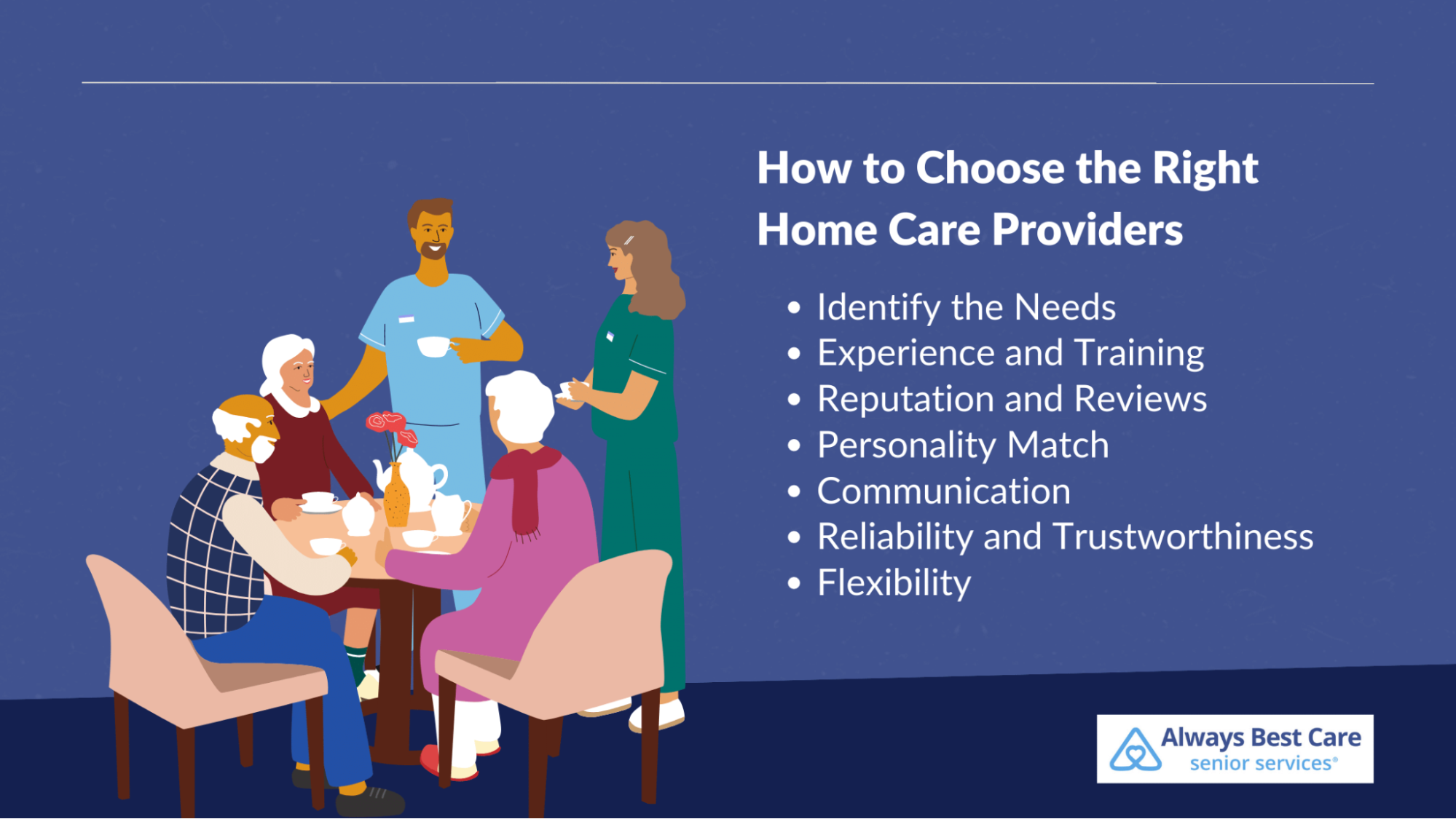
Choosing the right home care provider for your loved one is a huge responsibility, but with the right approach, you will find the perfect match:
- Identify the Needs: Start by clearly identifying your loved one’s specific needs. Are they mainly physical (bathing or medication)? Or are there significant memory issues caused by dementia?
- Experience and Training: Make sure the care provider has experience and training in the specific type of care your loved one needs. Don’t be afraid to ask about qualifications, training, and previous experiences.
- Reputation and Reviews: Look for home care providers with solid reputations. Read reviews, ask for references, and do your homework.
- Personality Match: Compatibility is crucial for the caregiver-patient relationship. Find a caregiver whose personality complements your loved one’s.
- Communication: Choose a home care provider that communicates well, respects your wishes, and keeps you in the loop with regular updates.
- Reliability and Trustworthiness: You must trust the care provider, as they’ll be spending plenty of time with your loved one. Always go with your gut feeling.
- Flexibility: Look for providers who can adapt to changes in your loved one’s needs over time.
Don’t rush the process. You might need to meet with several care providers before you find the perfect fit. That’s okay. This is about the well-being of your loved one, and it’s essential to make the choice you’re comfortable with.
How Can I Find a Home Health Care Agency?
Start off by doing a little bit of homework. Use the internet to find home health care agencies in your local area. Websites like Medicare’s Home Health Compare is a great place to start, as it allows you to compare agencies by their quality of patient care. Also, don’t overlook the power of word-of-mouth recommendations. Ask friends, neighbors, or healthcare professionals if they have any agencies they’d personally recommend.
Once you have a list of potential agencies, it’s time to start contacting them directly. Prepare a list of questions relevant to your loved one’s needs. Ask about their services, their staff’s qualifications, and how they train their professional caregivers. Don’t shy away from asking about their costs and how they handle emergencies.
Shortlist a few agencies based on the responses you receive. Arrange a face-to-face meeting with them to gauge their professionalism and commitment.
Before making a final decision, remember to check the agency’s license and accreditation status. Most states require agencies to be licensed and reviewed regularly. Accreditations from recognized bodies also ensure that the agency meets high standards of care.
How Much Does Home Care for Dementia Patients Cost?

The exact costs of home care for dementia patients vary depending on the location, the kind of services needed, and the frequency of care. To give you a ballpark figure, home care services typically cost anywhere from $37 to $39 per hour.
Agencies that provide specialized dementia care services cost slightly more due to the extra training and skills involved. Also, remember that medical care for other health issues, such as wound care or physical therapy, may add to the overall cost.
Fortunately, there are several ways to help offset these costs. Long-term care insurance, for instance, often covers home care. In certain cases, Medicare or Medicaid may cover some home care services (Source: Medicare.gov). Also, Veterans Affairs offers home health care benefits to eligible veterans (Source: Benefits.gov).
Choose Always Best Care for Your Loved One’s Home Health Care!
Just because your aging parent begins to show signs of dementia does not mean that they can no longer live independently, especially during early stages of this disease. They may continue aging in place with the help of an in-home caregiver who visits for a few hours per week or per day.
A caregiver can provide the support they need when they need it, allowing them to remain in the comfort and familiarity of their own home. Learn more about services and support for seniors with dementia by contacting Always Best Care at (760) 848-0427 and scheduling a free consultation.
References
- Eidschun, Anne, and Jamie Ramage. “My Loved One Has Dementia; Is in-Home Care an Option?” Delaware Journal of Public Health, vol. 7, no. 4, 2021, pp. 86–89, https://doi.org/10.32481/djph.2021.09.010 — Access date: 5 August 2023.
- Find home health services near me — Access date: 5 August 2023.
- Home Based Primary Care (HBPC) | Benefits.gov — Access date: 5 August 2023.
- Medicare & Home Health Care — Access date: 5 August 2023.





